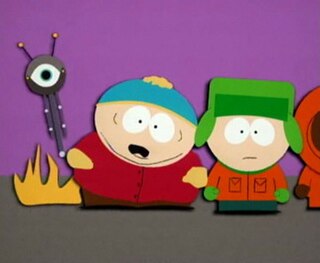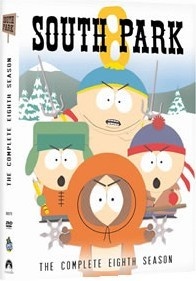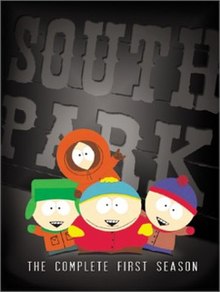
Kyle Broflovski is a fictional character in the adult animated sitcom South Park. He is voiced by and loosely based on series co-creator Matt Stone. Kyle is one of the series' four central characters, along with his friends Stan Marsh, Kenny McCormick, and Eric Cartman. He debuted on television when South Park first aired on August 13, 1997, after having first appeared in The Spirit of Christmas shorts created by Stone and long-time collaborator Trey Parker in 1992 and 1995.

Mr. Mackey Jr. is a fictional character in the adult animated television series South Park. He is voiced by series co-creator Trey Parker and debuted in the season one episode "Mr. Hankey, the Christmas Poo". The school counselor at South Park Elementary, he is best known for saying "m'kay" at the end of most of his sentences.

"Cartman Gets an Anal Probe" is the series premiere of the American animated television series South Park. It originally aired on Comedy Central in the United States on August 13, 1997. The episode introduces child protagonists Eric Cartman, Kyle Broflovski, Stanley "Stan" Marsh and Kenneth "Kenny" McCormick, who attempt to rescue Kyle's adopted brother Ike from being abducted by aliens.

"Simpsons Already Did It" is the seventh episode of the sixth season of the American animated television series South Park and the 86th episode of the series overall. It originally aired on Comedy Central in the United States on June 26, 2002. In the episode, which continues on from the events of the previous episode "Professor Chaos," Butters thinks up a series of schemes to take over the world, but realizes that each one has already been performed on the show The Simpsons. Meanwhile, Ms. Choksondik dies and Cartman, Kyle and Stan think that they are responsible.
"Damien" is the tenth episode of the first season of the American animated television series South Park. It originally aired on Comedy Central in the United States on February 4, 1998. In the episode, the boys' class is joined by a new student named Damien, who has been sent by his father Satan to find Jesus and arrange a boxing match between the two. The majority of South Park's residents bet on Satan to win the match due to his enormous size and muscular physique, but Satan ultimately throws the fight and reveals he bet on Jesus, thus winning everybody's money.
"Starvin' Marvin" is the eighth episode of the first season of the American animated television series South Park. It first aired on Comedy Central in the United States on November 19, 1997. In the episode, Cartman, Kenny, Kyle and Stan send money to an African charity hoping to get a sports watch, but are instead sent an Ethiopian child whom they dub "Starvin' Marvin". Later, Cartman is accidentally sent to Ethiopia, where he learns activist Sally Struthers is hoarding the charity's food for herself. In an accompanying subplot, after genetically engineered turkeys attack South Park residents, Chef rallies the residents to fight back, in a parody of the film Braveheart.
"Chef's Chocolate Salty Balls" is the ninth episode of the second season of the American animated television series South Park. The 22nd episode of the series overall, it originally aired on Comedy Central in the United States on August 19, 1998. The episode was written by series co-creators Trey Parker and Matt Stone, along with Nancy M. Pimental, and directed by Parker.
"Mecha-Streisand" is the twelfth and penultimate episode of the first season of the American animated television series South Park. It originally aired on Comedy Central in the United States on February 18, 1998. In the episode, Barbra Streisand obtains the Diamond of Pantheos from Stan, Cartman, Kyle and Kenny, and transforms into a giant mechanical dinosaur called Mecha-Streisand. She is ultimately defeated by The Cure frontman Robert Smith, who himself transforms into a giant moth monster.

"Mr. Hankey, the Christmas Poo" is the ninth episode of the first season of the American animated television series South Park. It originally aired on Comedy Central in the United States on December 17, 1997. The episode follows Kyle as he feels excluded from the town's Christmas celebrations due to being Jewish, finding solace in Mr. Hankey, a sentient piece of feces. Mr. Hankey does not come alive in the presence of other characters, who consequently think that Kyle is delusional. Meanwhile, the townspeople remove all religious aspects of Christmas to remain politically correct and inoffensive.
"Cartman's Mom Is a Dirty Slut" is the thirteenth and final episode of the first season of the American animated television series South Park. It originally aired on Comedy Central in the United States on February 25, 1998. The episode is the highest viewed episode in the entire South Park series, with 6.4 million views. It is part one of a two-episode story arc, which concluded with "Cartman's Mom Is Still a Dirty Slut". The episode follows Eric Cartman, one of the show's child protagonists, becoming curious about the identity of his father. He discovers that his father is most likely a man his mother had sexual intercourse with during an annual party called "The Drunken Barn Dance". Meanwhile, his friends Stan, Kyle and Kenny participate on America's Stupidest Home Videos, after filming Cartman playing in his yard with plush toys.
"A Very Crappy Christmas" is the 17th and final episode of the fourth season of the animated television series South Park, and the 65th episode overall. It first aired on Comedy Central in the United States on December 20, 2000. In the episode, Kyle awaits Mr. Hankey on Christmas, but he does not show up. To try to spread some Christmas cheer, Kyle and the boys decide to create their own animated special.

The second season of South Park, an American animated television series created by Trey Parker and Matt Stone, began airing on April 1, 1998. The second season concluded after 18 episodes on January 20, 1999; it remains the longest season of South Park to date. Almost all the episodes were directed by series co-creator Trey Parker, with the exception of two episodes directed by Eric Stough.

The third season of South Park, an American animated television comedy series, aired on Comedy Central from April 7, 1999, to January 12, 2000. The season was headed by series creators Trey Parker and Matt Stone, who also served as executive producers along with Anne Garefino. The season continued to focus on the exploits of protagonists Stan, Kyle, Cartman, and Kenny in the fictional Colorado mountain town of South Park.

The fourth season of South Park, an American animated television series created by Trey Parker and Matt Stone, began airing on April 5, 2000. The fourth season concluded after airing 17 episodes on December 20, 2000.

The fifth season of South Park, an American animated television series created by Trey Parker and Matt Stone, began airing on June 20, 2001. The season concluded after 14 episodes on December 12, 2001. The 14-episode season length would become a standard for later years of the series, starting from the eighth season up until the sixteenth season.

The sixth season of South Park, an American animated television series created by Trey Parker and Matt Stone, began airing on March 6, 2002. The sixth season concluded after 17 episodes on December 11, 2002. The sixth season is the first and only season of South Park to not feature Kenny McCormick as a main character, as his sole appearance in the season is extremely brief in the final moments of the season finale.

The eighth season of South Park, an American animated television series created by Trey Parker and Matt Stone, began airing on March 17, 2004. The eighth season concluded after 14 episodes on December 15, 2004, and was written and directed by Trey Parker. The season deals with various topics that were relevant at the time of release. The episodes portray a spectrum of topics, from the effect of large scale retail corporations to illegal immigration.

Gerald "Jerry" and Sheila Broflovski are fictional characters in the animated television series South Park. The two are an upper middle-class married Jewish couple who raise their ten-year-old son Kyle and three-year-old Canadian-born adopted son Ike in the fictional town of South Park, Colorado.
"Mr. Hankey's Christmas Classics" is the fifteenth episode of the third season of the animated television series South Park and the 46th episode of the series overall. An album of the same name consisting of versions of songs from the show as well as a number of additional songs was released the week prior to the episode's original air date, December 1, 1999.














